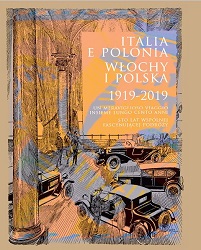
Dalla terra italiana alla Polonia. Un ricordo del generale Władysław Anders e dei suoi soldati. Z ziemi włoskiej do Polski. Wspomnienie o generale Władysławie Andersie i jego żołnierzach
Bilingual volume published in cooperation with the Embassy of Italy in Poland and with the Italian Institute of Culture to celebrate the centenary of the Italian-Polish diplomatic relations (1919–2019).Texts by the renowned Italian and Polish authors (translated from Italian to Polish or vice versa) are divided into two parts: “Diplomacy, economy, history” and “Art, film, literature, theatre”. Such division allows to follow the Polish-Italian bonds in different fields, from translation and performance of the Italian tragedies on the Polish stages, to cooperation with the FIAT company. There is also reflection on the Polish-Italian relations in the difficult interwar period and during the Second World War. In this context one text has exceptional significance - that of Vincenzo Mario Palmieri, Italian anatomic pathologist and a member of the international commission that examined the Katyń massacre in 1943.The volume not only for the Italophiles but also for all those interested in the history of the 20th century and in the issues of the international relations.
More...